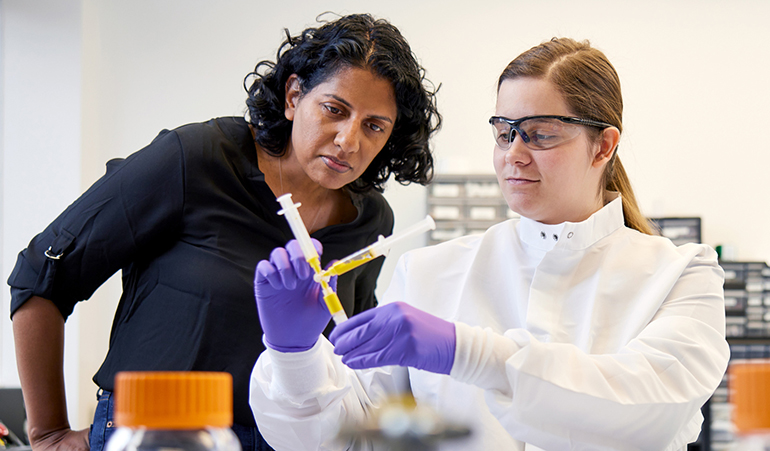Arsenal Medical, a medtech company based in Massachusetts, has developed Neocast, an embolic biomaterial designed for catheter-mediated embolization procedures. Conventional materials for embolization can have several limitations, including a lack of radiopacity, catheter clogging, catheter entrapment at the delivery site, solvent-mediated pain at the delivery site, and they can even cause sparking of electrocautery tools.
Neocast is solvent-free, avoiding delivery site pain, and functions with a unique shear-thinning action that allows deep vessel penetration. The material flows with the blood to embolize distal vessels first, providing more complete embolization. Neocast has also been created to be non-adhesive to catheters, reducing the chances of blockage, and can be delivered using standard microcatheters.
Medgadget had the opportunity to speak with Upma Sharma, President and CEO of Arsenal Medical, about the technology.
Conn Hastings, Medgadget: Please give us an overview of the application of embolic products, including how and when they are used.
Upma Sharma, Arsenal Medical: Embolization is a non-invasive procedure used to block blood flow of a target vessel. There are a wide range of clinical applications throughout the body for embolization including devascularizing tumors, stopping bleeding, treatment of aneurysms, and new applications are continually being explored. Typically, a catheter is inserted through either a puncture in the groin (femoral artery) or wrist (radial artery) and tracked to the target vessel where the embolic product is delivered or injected. The embolic product selected depends on the needs of the specific condition being treated and can be broadly segmented into two categories: proximal embolization which occludes flow close to the catheter tip (where products such as coils and plugs are used) and distal embolization where penetration deeper into the vascular bed is desired (where particles and liquid embolics are typically used).
Medgadget: What are the limitations with existing embolic solutions?
Upma Sharma: Particles and liquid embolics have traditionally been used to achieve penetration and occlusion of the microvasculature. Particles are not radiopaque making imaging during injection difficult and have been known to cause catheter clogging. Legacy liquid embolics have been on the market for over 20 years and have known limitations including inconsistent user experience, premature reflux, and catheter entrapment due to adhesion. The market’s current leading liquid embolic contains a solvent, dimethyl sulfoxide (DMSO), which can cause pain upon injection, necessitating the use of anesthesia and special compatible catheters. Other limitations include reduced visibility upon imaging due to artifacts, and the risk of sparking with electrocautery tools during surgical procedures. NeoCast was purpose-built to provide deep penetration, while addressing the limitations of existing products.
Medgadget: Please give us an overview of Neocast, and how it is intended to be used.
Upma Sharma: NeoCast is a solvent-free biomaterial that utilizes shear thinning science to enable deep penetration into target vessels in the brain while minimizing the risk of non-target embolization. Its unique material characteristics provide enhanced control during injection and consistent performance across users. NeoCast is radiopaque, MR-safe, non-adhesive, and compatible with many standard microcatheters. NeoCast’s promising characteristics are expected to have utility across additional neurovascular applications where deep vessel penetration is desired, including the treatment of chronic subdural hematoma (cSDH) and hypervascular spinal tumors. The on-going clinical trial for NeoCast is focused on preoperative embolization of hypervascular brain tumors, such as meningiomas. Hypervascular brain tumors are at risk of excessive bleeding during surgical removal, which can lead to complications, obstruction of the surgical field, and may result in longer procedure times. Preoperative embolization occludes blood flow to the tumor bed and can result in reduced blood loss during surgery. Recent studies have also demonstrated a benefit in recurrence-free survival after pre-operative embolization.
Medgadget: How does Neocast differ from pre-existing embolic technologies? What are its advantages?
Upma Sharma: NeoCast is a purpose-built embolic biomaterial that is differentiated from current products on the market. Specifically, NeoCast utilizes shear-thinning science to achieve a material that travels with the blood flow to fill and “casts” the most distal vasculature first. This provides the user with enhanced control for a more complete occlusion and minimizes the risk of premature reflux. Additionally, NeoCast is solvent-free which eliminates concerns related to the use of a solvent requiring management of patient pain (such as general anesthesia) and catheter compatibility.
Medgadget: Does the material require a specialized delivery device? How is it delivered, and how do you prevent device blockage?
Upma Sharma: NeoCast has been engineered to be non-adhesive to catheters and can be delivered using standard microcatheters, without a specialized device.
Medgadget: What other biomaterial technologies have you developed and how do they work?
Upma Sharma: Arsenal was founded with the broad vision of transforming medical devices with materials. In addition to NeoCast, we are also currently developing ResQFoam, a foam designed to rapidly expand throughout the abdomen to achieve control of intra-abdominal hemorrhage (imagine a human fix-a-flat). It is a potentially life-saving intervention that can rapidly stabilize a patient and serve as a bridge to definitive surgery for patients. Designated by FDA as a Breakthrough Device, ResQFoam creates conformal contact and applies pressure to an actively bleeding site within the body. It consists of two liquids that, when combined and injected into the abdomen using the ResQFoam delivery system, fill the abdominal cavity to control bleeding and create a solidified foam cast that covers the abdominal organs. The safety, effectiveness, and benefit-risk profile of ResQFoam are currently being evaluated in an IDE-approved study.
Arsenal is currently focused on advancing NeoCast and ResQFoam towards commercialization, while we also are exploring opportunities in peripheral embolization and women’s health.
Link: Arsenal Medical homepage…

